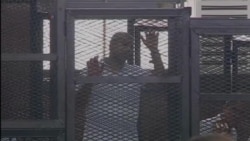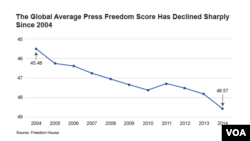A new report says worldwide working conditions for the news media have fallen sharply to their lowest point in more than 10 years. The study says journalists are facing more restrictions from governments, militants, criminals and owners of the media.
While the spread of smartphones and the internet means news is easier than ever to access, journalists are finding themselves in courtrooms, behind bars, intimidated, even silenced, according to a report by the independent watchdog organization, Freedom House.
“Unfortunately, the news is very bad. Press freedom suffered a global decline in 2014. It is the worst decline in a decade. Things are getting bad and they are getting bad even faster than they have in the past,” said Vice President for Analysis Vanessa Tucker.
The worst offenders on the organization's ranking of 199 nations or territories were North Korea, Uzbekistan, Turkmenistan, Belarus, Cuba, Syria, Iran and Crimea. Norway, Sweden and Belgium topped the list.
Overall, Freedom House says just 14 percent of the world's population lives in free countries "where coverage of political news is robust, the safety of journalists is guaranteed, state intrusion in media affairs is minimal, and the press is not subject to onerous legal or economic pressures."
The report attributed the decline in press freedom to an increase in restrictive laws against the press. It said these laws were often passed ostensibly for national security reasons.
Another reason cited for the deterioration of media liberties was the inability of local and foreign journalists to physically access and report freely in areas such as protest sites and war zones.
Americas
While much of North America was rated as having a free press, much of Latin America was either partially free or not free.
According to Freedom of the Press 2015, Mexico intimidated journalists and passed a controversial communications law.
The report also noted rollbacks in freedom in Honduras, Peru, Venezuela, and Ecuador. Press freedom was also ranked poorly in Cuba, despite the U.S. move to re-open diplomatic relations with the Communist country.
"[Despite] the resulting release of over 50 political prisoners in late December, journalists were still behind bars during 2014, and official censorship remained pervasive, leaving Cuba as the worst performer in the region with a score of 91," it noted.
The United States was criticized for the rough treatment of journalists by police during protests in Ferguson, Missouri.
The report also said "press freedom advocates remained concerned about certain practices and policies of the federal government, including the Obama administration’s relatively rigid controls on the information coming out of the White House and government agencies."
Asia-Pacific
In the Asia-Pacific region only five percent of the population had access to free media, while the rest were split evenly between partly free or not free.
China’s scored its lowest since the 1990s, as authorities jailed journalists and tightened control over media outlets.
“One of the areas that we noted that is a real problem globally and regionally right now is the impact of actors like China on their neighbors. So we saw that actions that China took had a negative impact, of course, in Hong Kong, in Taiwan and some of the other neighboring countries,” said Tucker.
Asia also includes the world's worst-rated country, North Korea, as well as historically poor performers Laos and Vietnam.
Myanmar, also known as Burma, experienced a reversal in press freedoms in 2014, a trend that follows several years of improvement following the end of direct military rule in 2011.
"This year we saw a number of journalists who were not only arrested or detained but also received prison terms. Some foreign journalists also encountered harsher visa restrictions," said Sarah Cook, a senior East Asia research analyst for Freedom House.
Middle East and North Africa
The report was largely negative about developments in the Middle East and North Africa, where a wave of street protests, referred to as the Arab Spring, has produced little results in the way of increased freedom.
"After historic gains in the Middle East in 2011, only one country has continued to make progress toward fulfilling the promise of the Arab Spring. Tunisia registered the best score of any Arab country in over a decade, although it remained Partly Free," the report said.
Only two percent of those living in the Middle East and North Africa have a free press environment, Freedom House estimates. It particularly highlighted declines in Egypt, Libya, Syria, and Iraq - countries that have seen increased militant activity in the past year.
Sub-Saharan Africa
In sub-Saharan Africa only three percent of the population is exposed to information from free media.
More than half of the press is partly free and nearly 40 percent are not free.
Sub-Saharan Africa was the only region to show improvement in press freedom in 2014, although the report said "most countries that earned improvements started from a low baseline, such as Central African Republic and Guinea-Bissau."
Eurasia
The Freedom House report says the Eurasia region’s average score remained the worst in the world.
More than 80 percent of the media was judged as not free and less than 20 percent partly free.
In Russia, the report says, there was a crackdown on independent voices inside the country and in neighboring nations.
“One of the big areas of troubling impact that we saw was in propaganda. So completely fabricated propaganda such that people inside of Russia have essentially no idea what is going on in conflicts like that in Ukraine,” said Tucker.
Europe
Europe was the group's highest-ranking region, although it noted that the region experienced the second-largest decline over the past decade.
Freedom House says the growing threats to the media are a stark challenge to democratic values around the globe.
VOA correspondent Meredith Buel contributed to this report.







